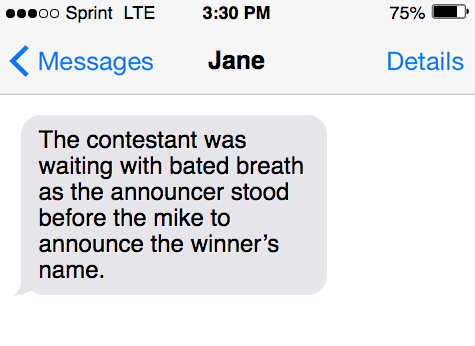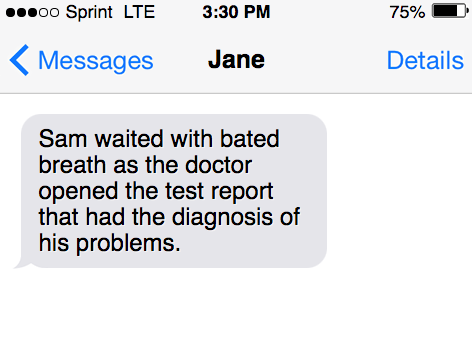What does “bated breath” mean? Why is this a common idiom in American English? And where did it originate?
Learn more in this short idiom guide…
What does “bated breath” or “baited breath” mean?
The phrase “bated breath” or “with bated breath” means waiting in anticipation. When you are waiting for someone or something eagerly with a lot of expectation, then this phrase can be used. The word bate is an adjective that means being excited or anxious. Bated breath refers to holding one’s breath in excitement or anxiety.
It refers to a situation where there is a lot of anticipation and nervousness about something that is going to happen. For example, if you have participated in a competition and awaiting the results you will be waiting with bated breath. You are in a state of high excitement and are probably holding your breath as you wait. This is a situation where this idiom or expression can be used.

The phrase has also been used as ‘baited breath.’ While this is not necessarily a correct usage, some people use it. ‘Bated breath’ is a situation of expectation where you await an event, a result, or a person who is expected. While people may not exactly hold their breath, it indicates a state of excitement. It is also interesting to note this phrase may sometimes be used as an ironic expression.
Origin of the idiom “bated breath”
The legendary English dramatist William Shakespeare is credited with having created many idioms through his works. “Bated breath” is an expression that Shakespeare first used. Since then, it has become a prevalent phrase. The first use of bated breath comes in the famous play “Merchant of Venice”.
Shakespeare uses the expression ‘with bated breath & whispering humbleness…’ His use of this expression gave a different meaning to the word bate. Earlier, the word bate was related to falconry. It was also used as a threat by a rapier/sword. For the first time, Shakespeare gave a new meaning to the word. The word bated would from then on would mean anticipation, excitement, or anxiety.
A question that comes up here is how did Shakespeare use the word bated with this meaning. There is an explanation for this. The word bated was used as a contraction for the word abated (as per the views of some experts). Abated means “become less strong.” But bated has a different meaning denoting excitement.
Some experts believe that Shakespeare used it to denote breath that has become less intense. A person reduces his breathing or stops breathing in anticipation of something. This seems to be an acceptable explanation for using the word bated.
Examples of “bated breath” used in sentences
The idiom bated breath can be used in sentences as highlighted in the examples given below:
- The contestant was waiting with bated breath as the announcer stood before the mike to announce the winner’s name.
- Sam waited with bated breath as the doctor opened the test report that had the diagnosis of his problems.
- With bated breath, the accused looked at the foreman of the jury as she stood up to announce the verdict of the jury.
- With bated breath and shivering fingers, she opened the envelope, wondering what was there in it.
- The fans waited with bated breath for the referee’s whistle to announce the match’s end.
“Bated breath” synonyms
The term bated breath is quite common. It has many synonyms that can be used as an alternative.
- Agog
- Anxious
- Eager
- Anticipation
- Excitement
- Enthusiasm
- Open-mouth
- Flabbergasted
Which is correct, “bated breath” or “baited breath”?
Bated breath is commonly used and a favorite of many writers. However, the phrase baited breath is also used. Before getting into whether it is correct, we need to look at its origin. While it is unknown who first used this term, it became famous thanks to the Harry Potter series.
Author J. K. Rowling used the term baited breath in the novel “Prisoner of Azkaban”. Since then, it has been used by others. Even newspapers have used this term. So, is this term correct? The answer is a clear no! It does not make sense to use baited breath. Whether J. K. Rowling used this deliberately or it was a typo, we don’t know. But it is not proper English.

Baited refers to baiting or luring to a trap. There is no logical connection between baited and breath. Baited breath would literally mean breathing hoping to lure someone. It definitely does not mean waiting in anticipation. It is a wrong use that should be avoided.
The two words bated and baited are homophones. They are words that sound similar but are spelled differently. This is a probable explanation for why people confuse bated and baited. Both words have entirely different meanings. Using baited breath does not make any sense. Bated breath is the correct form of the phrase.
Sources
- Bated Breath or Baited Breath – Meaning and Origin
- Bated Breath And Baited Breath? Which One Is Correct?
- “bated breath” vs. “baited breath” : Pardon the Expression
- Use with-bated-breath in a sentence
- Synonyms of with bated breath – Thesaurus.com
Inside this article
Fact checked:
Content is rigorously reviewed by a team of qualified and experienced fact checkers. Fact checkers review articles for factual accuracy, relevance, and timeliness. Learn more.
Core lessons
Glossary
- Abstract Noun
- Accusative Case
- Anecdote
- Antonym
- Active Sentence
- Adverb
- Adjective
- Allegory
- Alliteration
- Adjective Clause
- Adjective Phrase
- Ampersand
- Anastrophe
- Adverbial Clause
- Appositive Phrase
- Clause
- Compound Adjective
- Complex Sentence
- Compound Words
- Compound Predicate
- Common Noun
- Comparative Adjective
- Comparative and Superlative
- Compound Noun
- Compound Subject
- Compound Sentence
- Copular Verb
- Collective Noun
- Colloquialism
- Conciseness
- Consonance
- Conditional
- Concrete Noun
- Conjunction
- Conjugation
- Conditional Sentence
- Comma Splice
- Correlative Conjunction
- Coordinating Conjunction
- Coordinate Adjective
- Cumulative Adjective
- Dative Case
- Determiner
- Declarative Sentence
- Declarative Statement
- Direct Object Pronoun
- Direct Object
- Diction
- Diphthong
- Dangling Modifier
- Demonstrative Pronoun
- Demonstrative Adjective
- Direct Characterization
- Definite Article
- Doublespeak
- False Dilemma Fallacy
- Future Perfect Progressive
- Future Simple
- Future Perfect Continuous
- Future Perfect
- First Conditional
- Irregular Adjective
- Irregular Verb
- Imperative Sentence
- Indefinite Article
- Intransitive Verb
- Introductory Phrase
- Indefinite Pronoun
- Indirect Characterization
- Interrogative Sentence
- Intensive Pronoun
- Inanimate Object
- Indefinite Tense
- Infinitive Phrase
- Interjection
- Intensifier
- Infinitive
- Indicative Mood
- Participle
- Parallelism
- Prepositional Phrase
- Past Simple Tense
- Past Continuous Tense
- Past Perfect Tense
- Past Progressive Tense
- Present Simple Tense
- Present Perfect Tense
- Personal Pronoun
- Personification
- Persuasive Writing
- Parallel Structure
- Phrasal Verb
- Predicate Adjective
- Predicate Nominative
- Phonetic Language
- Plural Noun
- Punctuation
- Punctuation Marks
- Preposition
- Preposition of Place
- Parts of Speech
- Possessive Adjective
- Possessive Determiner
- Possessive Case
- Possessive Noun
- Proper Adjective
- Proper Noun
- Present Participle
- Prefix
- Predicate



